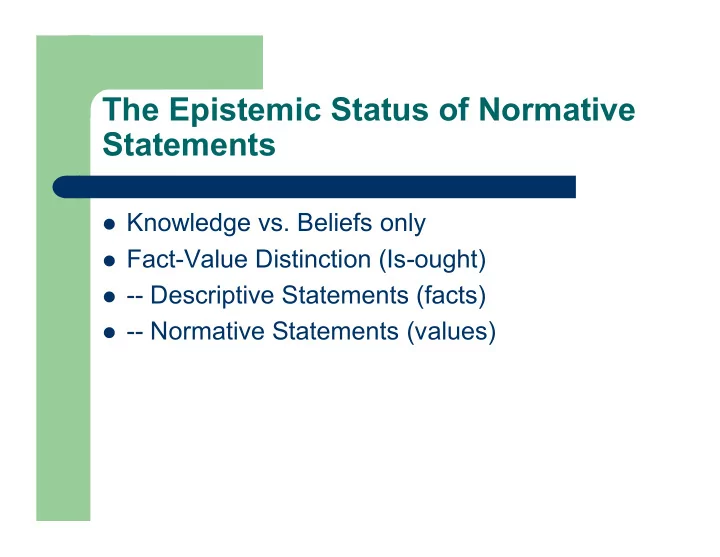

The Epistemic Status of Normative Statements � Knowledge vs. Beliefs only � Fact-Value Distinction (Is-ought) � -- Descriptive Statements (facts) � -- Normative Statements (values)
The Fact-Value Distinction � Descriptive statements (facts): � True or false, not both T and F at the same time. � Normative (moral) statements (values): � Appear to be both T and F at the same time.
Ethical Relativism � E. R. is the view that moral (normative) statements are not objectively true, but “true” relative to a particular individual or society that happens to hold the belief. � All moral statements are beliefs only. � Moral knowledge is impossible.
Ethical Objectivism � Moral statements are objective and universal. � Moral knowledge is possible.
An Operational Definition of Ethical Relativism: � Whenever two people or two societies disagree about the morality of an action (i.e., hold different and opposing views), both sides are equally correct.
Arguments for Ethical Relativism � 1. Diversity of Moral Views argument � The fact of disagreement and/or differences in moral beliefs is evidence for the claim that E. R. is true. � Ruth Benedict
Argument from the Diversity of moral views � 1. If people disagree about some claim, then that claim is subjective and relative. � 2. People do disagree about moral claims. � 3. Therefore, moral claims are subjective & relative, i.e., E.R. is true (both side sides are equally correct).
Arguments for Ethical Relativism � 2. Moral Uncertainty argument � The fact that I do not know for certain in a given situation what is right implies that ethical relativism is true. � Ethical Dilemmas � Relativism based on Skepticism
2. Analysis of Moral Uncertainty argument � Fallacy of Appeal to Ignorance � Skepticism
Arguments for Ethical Relativism � 3. Situational Differences Argument � Given the many differences in particular circumstances, what we call morality must be relative to the particular situation.
3 . Situational Differences Argument � 1. There are no absolute or universal moral rules. � 2. Therefore, all moral rules must be relative.
3. Analysis of Situational Differences Argument � This argument confuses Objectivism with Absolutism. � Absolutism: one set of absolute moral rules that apply in all places and at all times. � Objectivism: some moral claims are objective and universal, but particulars may vary.
Arguments for Ethical Relativism � 4. Toleration of Differences Argument � Tolerance for differences is consistent with ethical relativism. � E.R. promotes tolerance. � Objectivism promotes dogmatism/ intolerance.
4. Analysis of Argument from Toleration � This position is contradictory.
The Contradiction in E.R. � 1. “Right” means “right for a given society.” � 2. It is wrong for people in one society to interfere with the values of another society. � 3. But 2 is understood in a non-relativist sense, and therefore contradicts 1.
Ethical Relativism is counter- intuitive � X is moral = I like X. � X is moral and not moral. � Implications: � Can never talk about actions. � Can never be mistaken about morality. � Can change morality by changing my mind. � Can never really disagree about morality.
E.R. is counter-intuitive � X is moral = My society likes X. � All of the aforementioned implications. � +I cannot disagree with my own society.
Recommend
More recommend